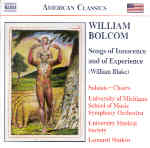William Bolcom’s ambitious setting of William Blake’s complete Songs of Innocence and Experience for soloists, multiple choral forces, and orchestra occupied the composer on and off, beginning as far back as the late 1950s, with most of the work completed between 1973-74 and 1979-82. The composer’s renowned eclectic bent makes itself felt in the work’s nearly two-and-one-half-hour length. Musical eras, styles, and performance practices leapfrog back and forth in unpredictable progressions, keeping the listener in a constant state of suspense as to what might occur next. For example, in the opening Songs of Innocence, Bolcom’s neo-Schoenbergian setting of “The Lamb”, replete with difficult, leaping intervals for the soprano soloist (brilliantly dispatched by Measha Brueggergosman), erupts into a thick, dissonant orchestral tutti that gives way to a lazy country-fiddle lament treatment of “The Shepherd”. No sooner do Peter “Madcat” Ruth’s hoary pipes twang out the tune than a bomb of orchestral cacophony crushes the Grand Ole Opry to smithereens. A brilliant children’s chorus (“Infant Joy”) emerges from the ruins, insidiously slipping into a funk-watered-down-for-Broadway-consumption groove for “The Little Black Boy”. Along the way we also encounter Handel oratorio, peppy English madrigals, Stephen Foster naiveté, Ivesian mysticism, Berio’s fractured folk songs, industrial-strength Varèse percussion ensembles, and effective speech-sung passages.
Bolcom’s thoroughly internalized command of such disparate idioms is matched and arguably surpassed by his gift for transitions, plus his ability for keeping orchestral and choral textures fresh, varied, and always interesting to the ear (his use of the harmonica within delicate string passages, for example). And even when some of his juxtapositions seem a bit far-fetched, such as the finale’s bloated Reggae pretensions (“I Shot the Sheriff” versus Also Sprach Zarathustra), at least Bolcom knows when long enough is long enough. In general, the longer Songs of Experience section contains darker, more serious selections, although the constant stylistic shifts make it difficult to immediately perceive the dramatic arc implied by Blake’s ordering of texts.
You couldn’t imagine a more varied group of vocal soloists. They run the gamut from Joan Morris’ unique cabaret approach and Thomas Young’s stentorian yet supple tenor, to Nathan Lee Graham’s ringing, focused baritone and Ilana Davidson’s attractive, silvery timbre in “The Angel”. The numerous choirs and the University of Michigan Orchestra obviously put in serious rehearsal hours (going into overtime, I’ll bet), and the sense of occasion hovering over these live performances certainly colors their first-rate contributions. And when you can’t help focusing your attention on the music rather than the musicians, as I did, it’s clear that Leonard Slatkin’s leadership does ample justice to Bolcom’s artistic vision and inner ear. Naxos provides full texts plus booklet notes by the composer. [10/12/2004]
































